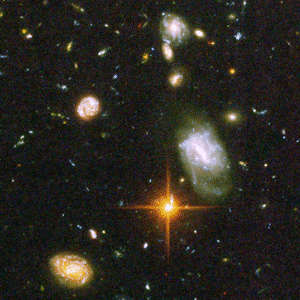Nobel Prize in Physics Awarded for Surprising Discovery About the Universe
Wednesday, October 5th, 2011Three United States-born astronomers won the Nobel Prize in physics for their revolutionary discovery that the universe is expanding at an accelerating (increasingly faster) rate. The force driving this expansion is thought to be a mysterious antigravitational force known as dark energy. The prize winners were Saul Perlmutter of the University of California, Berkeley; Adam G. Riess of the Space Telescope Science Institute and Johns Hopkins University; and Brian P. Schmidt of the Australian National University. Schmidt is also a citizen of Australia.
The finding by the three astronomers expands on another revolutionary discovery about the universe made in 1929 by American astronomer Edwin Hubble. He had observed that the farther apart galaxies are from each other, the faster they are moving away from each other. From this, Hubble determined that the universe is expanding at a uniform rate. Later scientists found evidence that the expansion began 13.7 billion years ago with a cosmic explosion known as big bang. For many decades, astronomers believed that the expansion was slowing down because of the counter force of gravity on the universe.

Galaxies in the universe are speeding away from one another at a faster and faster rate. NASA/ESA/S. Beckwith (STScl) and the HUDF Team
Then in 1998, Perlmutter, Reiss, and Schmidt shocked the scientific community with their finding that galaxies are actually speeding away from each other at a faster and faster rate. Studies of the light from supernovae (exploding stars) indicate that this expansion began about 5 billion years ago. To account for the acceleration, scientists concluded that the universe was full of some kind of invisible energy, which was named dark energy. Later measurements confirmed that approximately 70 percent of the mass (amount of matter) of the universe consists of dark energy.
Additional World Book articles:


